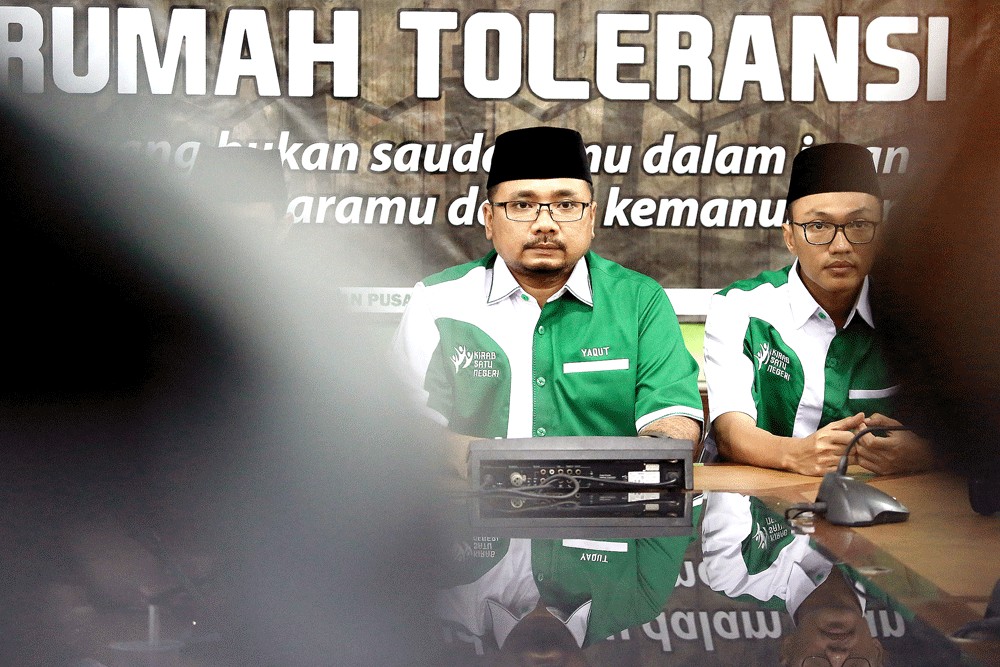Popular Reads
Top Results
Can't find what you're looking for?
View all search resultsPopular Reads
Top Results
Can't find what you're looking for?
View all search resultsGovernment to take on radicals with new minister
Experts say President Joko Widodo must have appointed the new religious affairs minister to nip the emergence of radicalist sentiment in the bud and build dialogue with other religious groups.
Change text size
Gift Premium Articles
to Anyone
In last week’s Cabinet reshuffle, one appointment stood out for Indonesia’s vast Muslim majority.
Fachrul Razi, a retired army general with a penchant for stirring debate, had been replaced as religious affairs minister by Yaqut Cholil Qoumas, the chairman of GP Ansor, the youth wing of the nation’s largest Muslim organization, Nahdlatul Ulama (NU).
For keen observers, the switch marked a return to regular practices, in which the Religious Affairs Ministry portfolio would be handed to a senior figure of the NU, as per tradition.
President Joko “Jokowi” Widodo had made the bold move of installing Fachrul in October 2019, drawing ire from the grassroots organization. A close ally of senior minister Luhut Pandjaitan, Fachrul became only the third person of a military background to occupy the post, if only for a year.
In the span of 14 months, the Hanura Party cadre sparked outrage for attempts to ban Muslim dress, cancel hajj pilgrimage departures over pandemic concerns and involve the military in fostering religious harmony.
Experts, however, believe the most recent leadership change had served to accentuate Jokowi’s intent to maintain stability in the face of heightened tensions with hardline ideological groups.
Recent trends show that strands of Islamic groups outside of NU and Muhammadiyah, the country’s second-largest Muslim group, had begun to proliferate again, aggressively occupying public spaces with their provocative rhetoric.
The appointment of Yaqut – widely known as Gus Tutut – showed that Jokowi was taking the issue more seriously, said political analyst Adi Prayitno of Syarif Hidayatullah State Islamic University (UIN) in Jakarta.
“This is the President’s answer to the rising radicalist [sentiment] of late,” Adi told The Jakarta Post on Wednesday. “Yaqut is not only [someone who is] prepared to compete at the discourse level; he is prepared to put his life on the line.”
As the leader of GP Ansor, Yaqut wields considerable influence over a group that is used to playing the role of gatekeeper to the state ideology Pancasila, national motto Bhinneka Tunggal Ika (Unity in Diversity) and Islam Nusantara, the prevailing strand of Islam that shows syncretism and reflects the nation’s multicultural realities.
The unit has been at the forefront of combating violent extremism, whether it be exposing subversive ideas in school textbooks, protesting against hardline groups or protecting religious minorities across the nation.
Yaqut also has authority over Ansor’s militia arm, Banser, which claims a membership of more than 5 million people, significantly more than the military’s 800,000 personnel. Banser has been involved in various events throughout the nation’s history, from the mass killings of 1965 and protecting churchgoers from a terrorist attack in 2000, to more recent standoffs with Hizbut Tahrir Indonesia, an outlawed mass organization.
President Jokowi said of NU’s youth wing in 2018: “GP Ansor has shown that our country’s heritage is the spirit of warriors and the sincerity of heroes. GP Ansor can’t be easily threatened, and that’s our spirit as a nation.”
Yaqut's appointment comes amid concerns that authorities are not being professional in their dealings with more outspoken elements of society.
Tensions have steadily risen between the government and the Islam Defenders Front (FPI) militant group following the return of its firebrand leader Rizieq Shihab from self-imposed exile in Saudi Arabia on Nov. 10. Police shot dead six FPI members following an alleged altercation at a rest area on the Jakarta-Cikampek toll road earlier this month, when Rizieq was reportedly being transported away from the reach of authorities.
He was later detained after being named a suspect in a police investigation into alleged breach of COVID-19 health protocols on two accounts; the wedding of Rizieq’s daughter on Nov. 14 and the FPI’s celebrations on Prophet Muhammad’s birthday afterward had attracted a crowd of thousands in spite of physical distancing curbs.
The shooting caused an uproar and accusations of extrajudicial killings were leveled at the Jakarta Police, which claimed self-defense. Investigations are underway to determine whether officers had adhered to proper protocol.
Speaking after his swearing-in ceremony on Wednesday, Yaqut promised many solutions.
“There are a lot of things that I want to work on, but it can be summarized in a short sentence: How to turn religion into an inspiration, not an aspiration,” he said at the State Palace in Jakarta. “We will be seeing solutions from the Religious Affairs Ministry not seen in previous periods.”
In a Facebook post published on Thursday, Yaqut went on to elaborate on his mission at the ministry, calling out individuals or groups who misuse religion to pit different groups against one another. “No longer will there be any room for anyone to use religion as a means to a political end and risk the nation’s stability,” he said.
Centre for Strategic International Studies (CSIS) political researcher Arya Fernandes said that by appointing Yaqut, Jokowi would likely rely on his proximity to the NU to approach other groups.
“I think the President sees the need for a figure [that] is expected to be able to communicate and build dialogue with other Islamic mass organizations,” Arya told the Post on Thursday.
Later that day, the minister promised to affirm the religious rights of the Shia and Ahmadiyah Muslims – as well as all other religious groups – and ensured that there would no longer be any persecution of minority groups.










